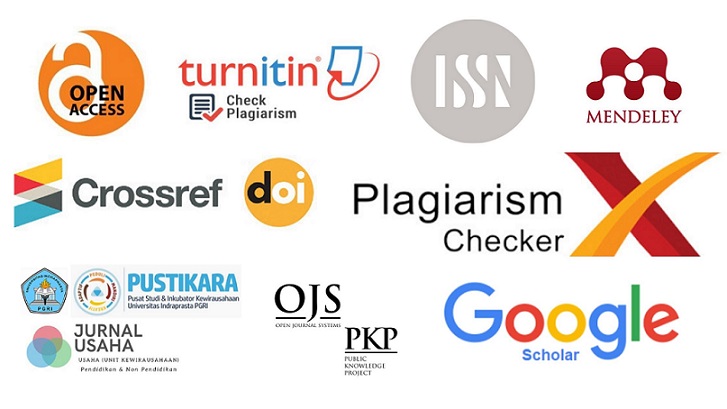The Influence of Entrepreneurship Education, Entrepreneurial Knowledge and Entrepreneurial Inspiration on Generation Z’s Entrepreneurial Intention
Khalifah Sholihah(1*), Agus Wibowo(2), Karunia Dianta(3),
(1)
(2)
(3)
(*) Corresponding Author
Abstract
Keywords
Full Text:
PDFReferences
Cilliers, E. J. (2017). The challenge of teaching generation Z. (January). https://doi.org/10.20319/pijss.2017.31.188198
Cui, J., Sun, J., & Bell, R. (2019). The impact of entrepreneurship education on the entrepreneurial mindset of college students in China : The mediating role of inspiration and the role of educational attributes. The International Journal of Management Education, (November 2018), 100296. https://doi.org/10.1016/j.ijme.2019.04.001
Fayolle, A., & Liñán, F. (2014). The future of research on entrepreneurial intentions. Journal of Business Research, 67(5), 663–666. https://doi.org/10.1016/J.JBUSRES.2013.11.024
Franco, M., Haase, H., & Lautenschläger, A. (2010). Students’ entrepreneurial intentions: An inter-regional comparison. Education + Training, 52(4), 260–275. https://doi.org/10.1108/00400911011050945
Hair, J. F., Ringle, C. M., & Sarstedt, M. (2013). Partial least squares structural equation modeling: Rigorous applications, better results and higher acceptance. 46(1-2), 1–12.
Harber, J. G. (2011). Generations in the Workplace : Similarities and. 103. Retrieved from https://dc.etsu.edu/etd/1255/
Iorgulescu, M.-C. (2016). Generation Z and Its Perception Of Work. Cross-Cultural Management Journal, 18(1), 47–54.
Karyaningsih, R. P. D., Wibowo, A., Saptono, A., & Narmaditya, B. S. (2020). Does entrepreneurial knowledge influence vocational students’ intention? Lessons from indonesia. Entrepreneurial Business and Economics Review, 8(4), 138–155. https://doi.org/10.15678/EBER.2020.080408
Kozlinska, I. (2011). CONTEMPORARY APPROACHES TO ENTREPRENEURSHIP EDUCATION. Journal of Business Management, 4(205–220).
Kusmintarti, A. (2017). the Relationship Between Creativity, Entrepreneurial Attitude and Entrepreneurial Intention (Case Study At the Students of State Polytechnic Malang). International Journal of Trade and Global Markets, 10(1), 1. https://doi.org/10.1504/ijtgm.2017.10002798
Mukhtar, S., Wardana, L. W., Wibowo, A., & Narmaditya, B. S. (2021). Does entrepreneurship education and culture promote students’ entrepreneurial intention? The mediating role of entrepreneurial mindset. Cogent Education, 8(1). https://doi.org/10.1080/2331186X.2021.1918849
Mwasalwiba, E. S. (2010). Entrepreneurship education: A review of its objectives, teaching methods, and impact indicators. Education and Training, 52(1), 20–47. https://doi.org/10.1108/00400911011017663
Nabi, G., Walmsley, A., Liñán, F., Akhtar, I., & Neame, C. (2018). Does entrepreneurship education in the first year of higher education develop entrepreneurial intentions? The role of learning and inspiration. Studies in Higher Education, 43(3), 452–467. https://doi.org/10.1080/03075079.2016.1177716
Nguyen, T. T., Nguyen, L. T. P., Phan, H. T. T., & Vu, A. T. (2021). Impact of Entrepreneurship Extracurricular Activities and Inspiration on Entrepreneurial Intention: Mediator and Moderator Effect. SAGE Open, 11(3). https://doi.org/10.1177/21582440211032174
Plumly, L. W., Marshall, L. L., Eastman, J., Iyer, R., & ... (2006). Developing Entrepreneurial Competencies: a Student Organization Business. … Conference. Academy of …, (January). Retrieved from http://citeseerx.ist.psu.edu/viewdoc/download?doi=10.1.1.117.1930&rep=rep1&type=pdf#page=13
Preacher, K. J., & Hayes, A. F. (2008). Asymptotic and resampling strategies for assessing and comparing indirect effects in multiple mediator models. Behavior Research Methods, 40(3), 879–891. https://doi.org/10.3758/BRM.40.3.879
Roxas, B. (2014). Effects of entrepreneurial knowledge on entrepreneurial intentions: A longitudinal study of selected South-east Asian business students. Journal of Education and Work, 27(4), 432–453. https://doi.org/10.1080/13639080.2012.760191
Roy, R., Akhtar, F., & Das, N. (2017). Entrepreneurial Intention Among Science & Technology Students in India: Extending The Theory of Planned Behavior. International Entrepreneurship and Management Journal, 13(4), 1013–1041. https://doi.org/10.1007/s11365-017-0434-y
Schawbel, D. (2014). Gen Z Employees: The 5 Attributes You Need to Know. Retrieved November 21, 2022, from https://www.entrepreneur.com/article/236560
Sher, A., Abbas, A., Mazhar, S., & Lin, G. (2020). Fostering sustainable ventures: Drivers of sustainable start-up intentions among aspiring entrepreneurs in Pakistan. Journal of Cleaner Production, 262, 121269. https://doi.org/10.1016/J.JCLEPRO.2020.121269
Souitaris, V., Zerbinati, S., & Al-Laham, A. (2007). Do entrepreneurship programmes raise entrepreneurial intention of science and engineering students? The effect of learning, inspiration and resources. Journal of Business Venturing, 22(4), 566–591. https://doi.org/10.1016/J.JBUSVENT.2006.05.002
Suhandi, N., Putri, E. A. K., & Agnisa, S. (2018). Analisis Pengaruh Jumlah Penduduk terhadap Jumlah Kemiskinan Menggunakan Metode Regresi Linear di Kota Palembang. Jurnal Ilmiah Informatika Global, 9(2), 77–82. https://doi.org/10.36982/jig.v9i2.543
Tambunan, T. (2008). SME development, economic growth, and government intervention in a developing country: The Indonesian story. Journal of International Entrepreneurship, 6(4), 147–167. https://doi.org/10.1007/s10843-008-0025-7
Umi, S., Widjaja, M., & Wibowo, A. (2022). Identifying factors affecting entrepreneurship education and entrepreneurial intention among Indonesian university students. 10(3), 89–104.
Wardana, L. W., Narmaditya, B. S., Wibowo, A., Fitriana, Saraswati, T. T., & Indriani, R. (2021). Drivers of entrepreneurial intention among economics students in Indonesia. Entrepreneurial Business and Economics Review, 9(1), 61–74. https://doi.org/10.15678/EBER.2021.090104
Wartiovaara, M., Lahti, T., & Wincent, J. (2019). The role of inspiration in entrepreneurship: Theory and the future research agenda. Journal of Business Research, 101(June), 548–554. https://doi.org/10.1016/j.jbusres.2018.11.035
Wibowo, A., Widjaja, S. U. M., Utomo, S. H., Kusumojanto, D. D., Wardoyo, C., Wardana, L. W., & Narmaditya, B. S. (2022). Does Islamic values matter for Indonesian students’ entrepreneurial intention? The mediating role of entrepreneurial inspiration and attitude. Journal of Islamic Accounting and Business Research, 13(2), 242–263. https://doi.org/10.1108/JIABR-03-2021-0090
Yadewani, D., & Wijaya, R. (2017). Pengaruh e-Commerce Terhadap Minat Berwirausaha. Jurnal RESTI (Rekayasa Sistem Dan Teknologi Informasi), 1(1), 64–69. https://doi.org/10.29207/resti.v1i1.6
DOI: https://doi.org/10.30998/juuk.v4i1.1838
Article Metrics
 Abstract Views : 443
|
Abstract Views : 443
|  PDF Views : 468
PDF Views : 468
Refbacks
- There are currently no refbacks.

This work is licensed under a Creative Commons Attribution-ShareAlike 4.0 International License.








